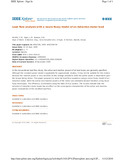Load flow analysis with a neuro-fuzzy model of an induction motor load
| dc.contributor.author | Muriithi, Christopher M. | |
| dc.contributor.author | Ngoo, L.M | |
| dc.contributor.author | Nyakoe, G.N | |
| dc.date.accessioned | 2017-09-07T08:07:50Z | |
| dc.date.available | 2017-09-07T08:07:50Z | |
| dc.date.issued | 2009 | |
| dc.identifier.uri | http://hdl.handle.net/123456789/2802 | |
| dc.description.abstract | In the conventional load flow study, the active and reactive powers of all load buses are generally specified. Although the constant power model is applicable for approximate studies, it may not suitable for the motors because the reactive power is very sensitive to the voltage variations while the active power is dependent upon the torque being driven. The paper proposes to solve the load flow equations with neuro fuzzy induction motor models. Both the motor active power and reactive power are estimated at each iteration using neuro fuzzy techniques. The efficiency is estimated using the IEEE 30 bus system. The results indicate that the inclusion of induction motor loads has an effect on the convergence characteristic of the active and reactive power mismatches of the modified load flow. | en_US |
| dc.language.iso | en | en_US |
| dc.subject | Component; | en_US |
| dc.subject | induction motor loads, | en_US |
| dc.subject | neuro-fuzzy, | en_US |
| dc.subject | load flow | en_US |
| dc.title | Load flow analysis with a neuro-fuzzy model of an induction motor load | en_US |
| dc.type | Technical Report | en_US |

